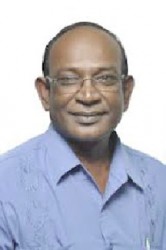Local Government Minister Ganga Persaud yesterday told a news conference that the parliamentary review of the four reform bills is still not complete and he remained hopeful of concessions from the opposition on areas of contention.
But APNU MP Basil Williams, Chairman of the Special Select Committee responsible for reviewing the proposed legislation,

yesterday said government’s attempts to reopen issues that have already been settled is wasting time and puts early elections at risk. Williams told Stabroek News that the report on the committee’s work is to be vetted before it is brought to the National Assembly on July 18th.
The Local Government Commission Bill, the Local Government (Amendment) Bill, the Municipal and District Councils (Amendment) Bill and the Fiscal Transfers Bill, which have been in the making for years, were sent for review by the special select committee earlier this year.
Ahead of a Cabinet meeting yesterday, Persaud was asked about his fellow ministers’ position on the state of the bills as deliberated at the level of the select committee but he was unable to say how they felt, explaining that he himself is just a member. He added that Roger Luncheon, Head of the Presidential Secretariat, would be in a better position to make such an assessment.
Much scepticism concerning the possibility of having local government elections this year already abounds and the inability of Persaud to give a clear indication of the government’s position on the current state of the bills does not help in determining its intended actions once the report is tabled in the National Assembly and the motions for the second and third readings are made.
Persaud said that the committee’s work is not finished since the consideration of the bills has not been completed.
Williams, late last month, had stated that the bills’ consideration were completed and that the report on the committee’s deliberations was to be completed by the Parliamentary Counsel, then scrutinised by the committee to ensure it reflected what took place during the meetings.
Williams had said that he expected the scrutiny to be completed when the committee met last Friday. Several inaccuracies detected in the report, however, prevented this from happening, Williams said. As a result, the committee is expected to meet at least once more to vet the report.
Persaud, however, maintains that the committee’s work is not done, especially since several issues, including the number of members that are to constitute the Local Government Commission, and the transferral of several responsibilities the minister now holds to the said Commission, were raised.
Persaud said that during last Friday’s meeting, he reopened discussions on several issues and received support from the opposition. Specifically, he said that the opposition agreed to allow the minister to keep powers which they initially voted to take from his office and transplant into the Local Government Commission. On the issue of the composition of the Local Government Commission, however, he said that the opposition members maintained the decision they had taken initially.
According to Williams, the government had proposed that the Commission be comprised of eight (8) members. The opposition, however, voted for seven (7) members – three appointed by the president, three appointed by the president after consultations with the leader of the opposition, and the final member is to be nominated by the trade union bodies in the local government sector.
It is such instances, argues Persaud, which indicates the work of the committee is not done. Williams, on the other hand, said that what is currently being done is merely a vetting process, meant to ensure that the report reflects what was deliberated at the meetings.
He said that the committee’s mandate was to scrutinise the bills and take a decision on what changes were to be made to them. This, he said, has already been done. As it relates to the issues brought by the minister, Williams said that the opposition members were not obligated to reconsider the minister’s proposals.
In fact, he said the government’s attempts to reopen issues already deliberated on is wasting time and will further diminish any hopes which remain of having local government elections at the soonest convenience.
Nevertheless, he explained that the opposition, in retrospect, realised that some of the issues raised by the minister as it relates to his office keeping certain responsibilities were legitimate and therefore decided to change its previous position.
Meanwhile, while Persaud and Williams had been split on who will shoulder the responsibility for bringing the report to the National Assembly, there has been some progress on this front.
Previously, Williams had said that since the bills were initially brought by the Local Government Minister, it was his responsibility to bring the report to the National Assembly. Persaud, on the other hand, had said that he was unaware of any such obligations, and speculated that Williams was the one the one to lay the report in the National Assembly since he had chaired the committee which is the architect of their current composition.
Persaud yesterday stated though that when the time comes the report will be brought by Williams, and Williams, when contacted said that if this is the procedure then he will comply. Williams explained that the confusion on this matter stemmed from the fact that the committee’s make up is unprecedented. Specifically, this is the first time in history that an opposition MP has chaired a committee where bills tabled by a government minister were considered.




